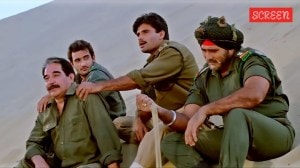Capturing the public space
Rahul Bose's indignant letter IE February 27, 2004 about the snide reporting that trivialised a serious political protest over film censor...

Rahul Bose8217;s indignant letter IE February 27, 2004 about the snide reporting that trivialised a serious political protest over film censorship, reflects a serious disquiet felt by many. Over the years a pattern has emerged in which not just your paper, but the media in general, has managed to present the public space in such a way that certain kinds of voices are either ridiculed or censored out of existence.
Only four categories merit serious attention from the media8212;8221;celebrities8221;, political parties, violent events and of course, the media itself. Thus, the Express has the space to publish long encomiums to itself on winning an award, but not for critical letters written over the years by many, pointing out the way in which certain kinds of events are either ignored or reported with bias. Thanks to Rahul Bose8217;s celebrity status, you were forced to publish his letter, although not without the belligerent last word from your reporter.
There is a pattern to this: Page 3 events are discussed with great seriousness, but I have seen many a report on book-launches that include snide remarks about the 8220;chatterati8221; and deride the fact that many of those the reporter spoke to hadn8217;t read the book. Never mind that most haven8217;t got hold of it as as yet! Again, when Noam Chomsky visited Delhi University in 2001 soon after the US attack on Afghanistan began, the atmosphere was electric 8212; over a thousand students and others from all over Delhi listening in a breathless hush. But your reporter conveyed that the whole thing was a lacklustre affair, and took care to note that two students were yawning.
Several people who had attended that event, later compared notes, and found that at least 10 letters had been sent to your paper, contesting that particular representation. Not one was published. Yet again, there seemed to be a consensus in the media to trash the World Social Forum with no pretense of objectivity. Every possible charge has been laid at its door, ranging from 8220;rolling in foreign funds8221; to sarcastic tips on how to join the 8220;elite anti-globalisation chic brigade.8221; At best it was reported as a lifestyle event, P3-style. When it comes to corporate globalisation, which the entire media stands firmly behind, then the newsworthiness of events is apparently decided by your values, not the actual magnitude of the event itself. Having discredited political parties albeit with justification!, the media has arrogated to itself the only permissible non-party voice of dissent.
At the same time, the media never stops patting itself on the back for its own fearless exposure of this, that and the other. The net result is an overwhelming dumbing-down of public debate over ideas 8212; everything presented like a 8220;Big Fight8221; not unsimilar to the WWF format. Highly orchestrated and stage-managed 8220;events8221; of noise, tiny sound-bites, and everyone 8220;for8221; or 8220;against8221;. The media will not suffer from opening up to complex analyses, recognition of emerging new forms of non-party protest, and responding to critique from its consumers. But, more importantly, it is imperative for a democratic polity that it does so.
- 01
- 02
- 03
- 04
- 05































